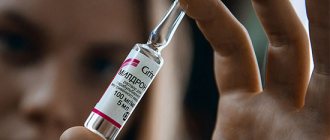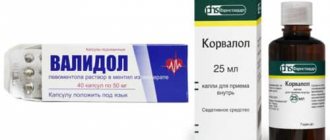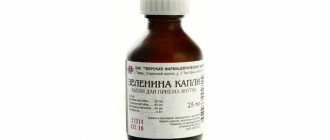Corvalol is a remedy with a calming and hypnotic effect, which is quite popular among people who experience regular stress and endure emotional overload. But among these people there are many hypertensive people who are interested in whether Corvalol increases or decreases blood pressure, whether it can be used during blood pressure surges, and also how to use the drug correctly so as not to harm the body.
It is necessary to immediately clarify that you need to handle the drug with caution, because it contains phenobarbital, so uncontrolled use of Corvalol can be harmful and provoke the development of side effects.
Indications for use
The medication in solid form is prescribed for the following symptoms:
- increased irritability;
- vegetative-vascular dystonia;
- hypertensive diseases;
- disturbed sleep;
- spasms of the coronary vessels.
Drops are effective for conditions such as:
- central nervous system disorder;
- neurotic state;
- mildly disturbed heartbeat;
- disturbed sleep.
When to use
The drug cannot treat any serious diseases. It is usually taken for dysfunction without serious pathologies (functional impairment). Corvalol is taken to reduce the excitability of the nervous system and as a drug with some vasodilating effect. It can help with increased irritability, agitation with difficulty falling asleep and body reactions such as sweating, redness, weakness (manifestations of autonomic reactions of the nervous system). Sometimes to relieve intestinal spasms.
The main purpose of taking Corvalol is to reduce the excitability of the nervous system and slightly dilate blood vessels.
The General Secretary of the Russian Scientific Medical Society of Therapists, Andrei Spassky, believes that the drug is beneficial. It helps with heart disease, rhythm disturbances, and cardioneurosis. There are about 17 million people suffering from coronary heart disease in Russia. Approximately every second person uses such drugs, because they have a fairly good antiarrhythmic effect.
Instructions for use
Pills
The medication is placed under the tongue when a quick effect is needed, or orally.
Corvalol can be taken 2 times a day, no more than 2-3 tablets.
The permissible single dose is 1 tablet; in case of urgent need, the dose can be increased to 3 tablets.
Drops
Dilute 15-25 drops of Corvalol in 50 ml of liquid. For tachycardia, the permissible single dose can be no more than 50 drops.
Depending on the age category and clinical situation, children are prescribed from 5 to 15 drops per day.
The length of treatment will depend on the indications. Sometimes a one-time use is enough. In some situations, drops/tablets should be taken 3 times a day. The duration of therapy is determined by the doctor, taking into account the therapeutic characteristics of the drug and its tolerability.
Special reactions to the components of the drug
The following negative reactions were observed in patients taking Corvalol:
- nausea;
- vomit;
- constipation;
- feeling of heaviness in the stomach;
- increased weakness;
- dizziness;
- hallucinations;
- headaches in the frontal lobe;
- anemia;
- thrombocytopenia;
- difficulty breathing.
Contraindications
For two types of medicinal drugs:
- acute renal and liver failure;
- lactation period;
- epilepsy;
- excessive sensitivity to the drug.
Tablets are also contraindicated in the following cases:
- lactose indigestibility;
- acute form of chronic heart failure;
- lack of glucose-galactose malabsorption;
- susceptibility to bromine;
- pregnancy.
The effect of Corvalol on blood pressure
Excessive pressure is dangerous with a violent increase in pressure and negative consequences, because all internal organs suffer from high readings. When using Corvalol in the body, the increase in blood vessels and impulse transmission of activity decreases, which leads to the fact that the heart rate slows down and the pressure begins to drop.
The effect of the drug is quite stronger and can affect the pressure indicator, reducing it by 15-20 points. It is worth considering that taking traditional medications together with Corvalole may increase the effect, so you should approach the drug with caution. Treatment with Corvalol is recommended only after receiving advice and setting a deadline with your doctor. Taking the drug if you have low blood pressure is unacceptable.
Adverse reactions
Corvalol in tablets and drops can cause negative effects:
- dizziness;
- excessive sleepiness;
- loss of performance;
- rash, itching;
- gastrointestinal disorder;
- labored breathing.
With prolonged use of the drug, there is a possibility of accumulation of bromine in the body, disruption of osteogenesis, development of symptoms of bromism, such as rhinitis, acne, conjunctivitis, lacrimation, stress, depression of the central nervous system.
Negative consequences, as a rule, disappear without a trace after reducing the dose or completely stopping the drug.
Compound
The effects of taking Corvalol are easily explained by its composition.
Alpha-bromoisovaleric acid ethyl ester has a sedative effect similar to valerian. It helps relax the smooth muscles of internal organs, slows down the transmission of nerve impulses and reduces blood pressure.
Phenobarbital in small dosages causes drowsiness, relaxation, and also relaxes smooth muscles. Increases the resistance of the nervous system to irritants, promotes the onset of sleep, but the sleep that occurs is not physiological.
Peppermint leaf oil promotes dilatation of blood vessels in the heart and brain. Strengthens intestinal contractility.
The combination of these components enhances their effect.
Overdose
Overdose symptoms:
- low blood pressure;
- excessive excitability;
- lethargy;
- unclear consciousness.
In case of a severe overdose of the substance, rapid heartbeat, arrhythmia, respiratory problems, and in rare cases, coma or severe outcome may be observed.
In case of side effects, you should stop taking Corvalol, rinse your stomach, eliminate caffeine from your daily diet, and give up nicotine.
With high blood pressure
For arterial hypertension, it is advisable to take Corvalol. Prescribing the drug is justified under the following circumstances:
- Blood pressure problems are caused by stressful circumstances;
- sleep disturbances are observed;
- Health problems are the result of hyperactivity, nervous tension and irritability appear;
- High blood pressure is caused by seizures.
Relieving spasms, dilating blood vessels and affecting the nervous system, after taking the drug there is a gradual decrease in pressure. The drug has a mild sedative effect, which has a positive effect on the patient's condition.
Doctors do not recommend taking the drug for a long period of persistently high blood pressure.
It is suitable when there is an urgent need to reduce blood pressure, when, due to circumstances, traditional medications for hypertension are not available.
special instructions
The presence of phenobarbital in the drug sometimes contributes to the development of syndromes such as Steven-Johnson or Leilla, which is especially important at the initial stage of taking the drug. Ethanol and phenobarbitol are the main components of the drops, their turnover is 55%. The alcohol concentration in small doses is 250 mg, which corresponds to 6.5 ml of beer. While taking the drug, the following are possible:
- dizziness;
- lethargy;
- drowsiness;
- violation of coordination of actions.
During the period of treatment with the drug:
- It is prohibited to drink alcohol;
- It is not recommended to engage in potentially dangerous activities, including driving.
You can buy the drug at any pharmacy. Tablets and drops in containers of 15 and 25 ml are available without a prescription. Vials containing 50 ml of the substance are sold with a prescription.
The shelf life of drops is 2.5 years, tablets - 24 months from the date of production.
The medication should be stored at room temperature.
Taking medication for hypotension
It is not recommended to use Corvalol for low blood pressure, since the increase in blood pressure is caused by vasoconstriction, and in hypotensive patients the capillaries are usually dilated. Taking the drug will lead to their even greater expansion, which can worsen the patient’s well-being and be dangerous.
If you have low blood pressure, you can take drops, but only to achieve a hypnotic and sedative effect, and the dosage should be less than usual
If a hypertensive patient drinks 30 drops of the drug for insomnia, then 20-25 will be enough for a hypotensive patient. When used correctly for insomnia, Corvalol does its job - a person with low blood pressure calms down and falls asleep, and drowsiness after taking phenobarbital can be observed for 15 hours in a row. Since Corvalol lowers blood pressure, a hypotensive patient may feel weak and dizzy after using it in a larger dosage than necessary.
In severe cases, loss of consciousness occurs. This effect is due to the fact that people with low blood pressure often feel tired due to impaired oxygen transport to the brain tissue. And taking a sedative only worsens the condition. Therefore, people whose blood pressure is usually within 100/60 or less are not recommended to use Corvalol at all.
Drug during pregnancy
The instructions indicate that Corvalol tablets and drops are contraindicated for use while pregnant.
The use of the drug in the 1st trimester of pregnancy can negatively affect the development of the fetus, and in the 3rd semester it can provoke a disorder of the respiratory system of the newborn.
If there is an urgent need to take the drug during pregnancy, Corvalol can be used in minimal quantities. However, if possible, it is advisable to stop taking the drug.
Reactions, consequences of poisoning
In large doses, Corvalol reduces the metabolic rate and lowers body temperature due to its effect on the central mechanisms of thermoregulation. Reduces blood pressure. As a result, in acute poisoning, a decrease in renal filtration and the development of oliguria and anuria are possible.
The drug component phenobarbital significantly inhibits psychomotor reactions and impairs coordination of movements. Some doctors see this as an additional provoking factor for falls in older people with subsequent hip fractures. Osteoporosis, many contraindications to surgery for treatment, a long recovery period and bed rest can cause congestion in the lungs, the development of pneumonia, and ultimately lead to death.
The use of phenobarbital with alcohol not only greatly slows down psychomotor reactions and leads to impaired coordination. Overdose can cause coma and death. Long-term use of the drug causes fatigue, deterioration of memory and concentration, depression, headache, and tremor.
The instructions for medical use of the drug Corvalol do not prohibit the use of the drug simultaneously with alcohol. At the same time, the Roszdravnadzor database recorded adverse reactions when taking the drug Corvalol, which in some cases led to death. These cases were associated with its uncontrolled use in combination with alcohol.
The instructions for Corvalol do not prohibit the use of the drug simultaneously with alcohol, but cases of death have been recorded when it is taken uncontrolled along with alcohol.
Benefits and harms
Everyone knows for what purpose the drug is taken. The effectiveness of Corvalol has been proven by many years of practice. However, recently information has begun to appear that the substance not only heals, but also causes harm to health.
Since the drug contains an antispasmodic - ethyl bromizovalerant, which, taking into account the dosage, can have a hypnotic or sedative effect on the body.
Phenobarbital, which is included in the composition, does not have a hypnotic effect, however, when taking the usual dose, it dilates blood vessels.
Peppermint oil can provoke a spasmodic reaction and dilate blood vessels. With an increased dose, it causes constipation and disrupts the functioning of the gastrointestinal tract.
With long-term use of the drug in large doses, phenoborbital leads to an unsteady gait, speech impairment, memory loss, and causes neurological disorders.
Harm of Corvalol.
With a single dose, the harm of Corvalol can only consist of possible allergic reactions, increased inhibitory effects of other medications taken, and overdose when taken in large doses. The main danger lies in cases of long-term and constant use of Corvalol. In such cases, the nervous system suffers: toxic encephalopathy develops with sleep disturbances, memory loss (even dementia), polyneuropathy; when Corvalol is withdrawn, convulsions and a withdrawal state with psychosis may develop. Long-term use of Corvalol is harmful with a high risk of developing mental and physical dependence, because, as written above, it contains two strong psychoactive substances: ethyl alcohol and phenobarbital. Treatment of encephalopathy and addiction caused by Corvalol may require hospitalization.
In conclusion, I would like to point out that medications should be taken only as prescribed by a doctor. Self-medication is dangerous!
Corvalol contains two strong psychotropic components: ethyl alcohol and phenobarbital. With constant use, it causes dependence and the need to take larger and larger doses, and after stopping its use or reducing the dose, withdrawal syndrome develops. Be careful with Corvalol and you will be healthier!
Is it possible to use Corvalol for VSD?
Vegetative-vascular dystonia is not a diagnosis, but this condition well characterizes the well-being of many people. It is accompanied by fatigue, dizziness that occurs with a sudden change in body position, including darkening of the eyes. Dystonia is a condition of blood vessels in which they do not have time to respond to a change from a horizontal to a vertical body position, and also cannot expand in a timely manner to allow more blood to pass through during sports activities.
In this case, the effect of Corvalol is explained by several factors:
- mint makes blood vessels more elastic;
- bromine reduces anxiety, which increases the symptoms of VSD;
- phenobarbital enhances the effect of the other two components, improving sleep.










